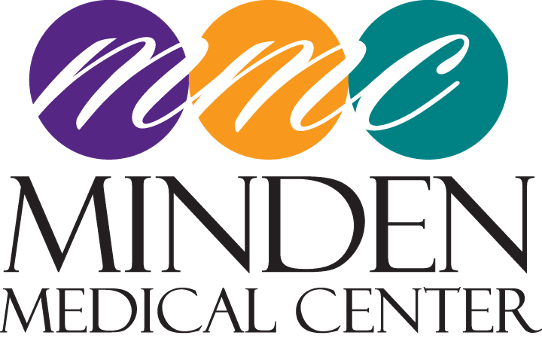
Minden Medical Center (MMC) offers medical imaging equipment, combined with top professional expertise. board-certified, fellowship-trained radiologist and compassionate, certified technologists understand time is valuable to our patients and referring offices.
That’s why MMC is committed to a 24-hour turnaround on reports to physician offices Monday thru Friday, and online access to patient files for physician offices. We cover your radiology needs on our MMC campus:
It’s Your Health, It’s Your Choice. Choose Minden Medical Center for your imaging needs.

Our GE VCT Light-speed Multislice Spiral CT Scanner, the latest in CT technology, dramatically shortens traditional scanning times and provides CT angiography and three-dimensional CT imaging. A CT Scan can be critically important for diagnosing and monitoring diseases of the brain, chest, abdomen, and pelvis, as well as some neurological problems.
A medical specialty that is used to diagnose diseases and conditions in a safe and painless way, nuclear medicine can provide medical information that may otherwise be unavailable, require surgery, or necessitate more expensive and/or invasive diagnostic tests. MMC offers a full range of nuclear medicine studies, including:
Utilizing state-of-the-art equipment, our registered medical Sonographers perform examinations of soft tissue portions of the body, including comprehensive obstetrical, gynecological and abdominal imaging as well as vascular color flow and doppler examinations.
We offer a full range of complete bone and joint x-ray studies, including chest x-rays, joint arthrography and traditional x-ray imaging. We also offer modified barium swallows, esophagrams and small bowel series.
Digital mammography can detect early-stage breast cancer. If you’re a woman 40 years of age or older, you should have a mammogram every year.
(A physician’s order is required for diagnostic mammograms, as is
a primary care physician to receive screening reports).
Concerned about breast cancer?
Determine your risk
In the fairy tale “The Princess and the Pea,” the heroine cannot sleep because she can feel a very small lump, even though it’s covered by dozens of mattresses.
In real life, we are not that lucky. By the time we can feel a lump in our own breasts, a cancerous tumor could possibly have grown larger and spread beyond the breast into other areas of our bodies. But with regular mammograms, doctors can detect small tumors at a much earlier stage – years before we can feel them – which significantly increases the opportunity for successful treatment.
Throughout the year and especially during October, which is National Breast Cancer Awareness Month, our hospital wants to make sure women know how important it is to have regular mammograms or x-rays of the breasts.
Doctors know that screenings for breast cancer save thousands of lives each year, and that many more lives could be saved if even more women took advantage of these tests.
While progress has been made across the board, including less invasive surgeries, genetic testing and more advanced diagnostic technology, an estimated 40,000 women are expected to die from breast cancer this year.
That means breast cancer is still one of the top killers of women in the United States, more than accidents, pneumonia or the flu. Breast cancer is the most common cancer among women in the U.S., other than skin cancer. It is the second leading cause of cancer death in women, after lung cancer.
That’s the bad news. But there’s good news as well. Right now there are about two and a half million breast cancer survivors in the United States.
Breast cancer death rates are going down. This is the result of more women having mammograms which can find the cancer during its earliest, most curable stages, as well as advances in treatment.
The chance of a woman having breast cancer some time during her life is about 1 in 8 while the chance of dying from breast cancer is about 1 in 35. About 182,460 women in the United States will be diagnosed with breast cancer this year.
Minden Medical Center
#1 Medical Plaza
Minden, Louisiana
71055
318-377-2321
